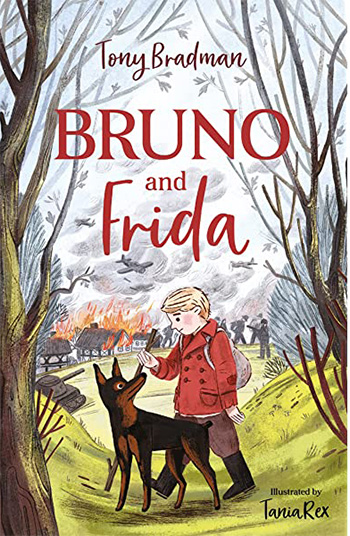Bruno and Frida
By Tony Bradman (Barrington Stoke)

Review by Jacob and Linda
We both really liked book, particularly where Bruno finds and names Frieda – and the name just pops into his head. Oma is a wonderfully kind character because she let Bruno stay at her house, and helps him on his journey so that he stops getting attacked by the Russians.
Bruno and Frieda’s friendship is very powerfully written; they save one another's life. It was awful to learn that sometimes people used dogs as a weapon in war. We learnt about some of the horrors that ordinary people faced in the war. When Bruno’s mum is killed, that was awful. We hated the Russian army when we read the book because they destroyed the town, killed lots of people and they were so rude. It was weird because, when you read the book, it it feels like the Russians were attacking for no reason, but we know about World War Two and how the Germans had been bad to the Russians. It really made us think about how lots of innocent people – on both sides – get caught up in war. There is a quote at the beginning of the book which says “if the dead could speak, there would be no more war” – it’s so sad, but also a little heart warming; if only it could happen. It makes you think about the people you used to remember, who passed away, and what they could say.
Review by Noah
I enjoyed the book because I learned about some more history. I learned the following new words whilst reading this story they where: brooding, twilight and perilous.
I didn’t like the Russians because they kept on bombing. I would recommend this book to other children because they can learn about world war 2. The part of the story which stands out the most is when Bruno’s mum dies because it gets emotional.
Review by Maxwell
Bruno and Frida is a harrowing tale of friendship and adventure, set towards the end of World War II. The heroes of the book are very compelling due to their unlikely friendship; one a German boy and the other a Russian explosives dog sent to destroy German vehicles. Despite being from opposing sides, they are dependent on each other in order to survive in wartime Germany. Tony Bradman powerfully demonstrates that war is not black and white by illustrating some of the complexities of combats.
As an aspiring historian, this piece of fiction was particularly interesting to me because it highlighted the atrocities committed by both sides and despite the Allied victory in headlines, there is absolutely no winner in war. Having studies the facts and dates of the particular battle, it was very thought-provoking to read such an emotive tale of a personal nature.
The language is very accessible in this story, which is contrasted with the darker atmosphere created by the author, and therefore I would not recommend this story for younger audiences.
As the years pass, it is possible to feel distanced from World War II, but stories such as these make history come to life. It was an incredibly powerful read.

